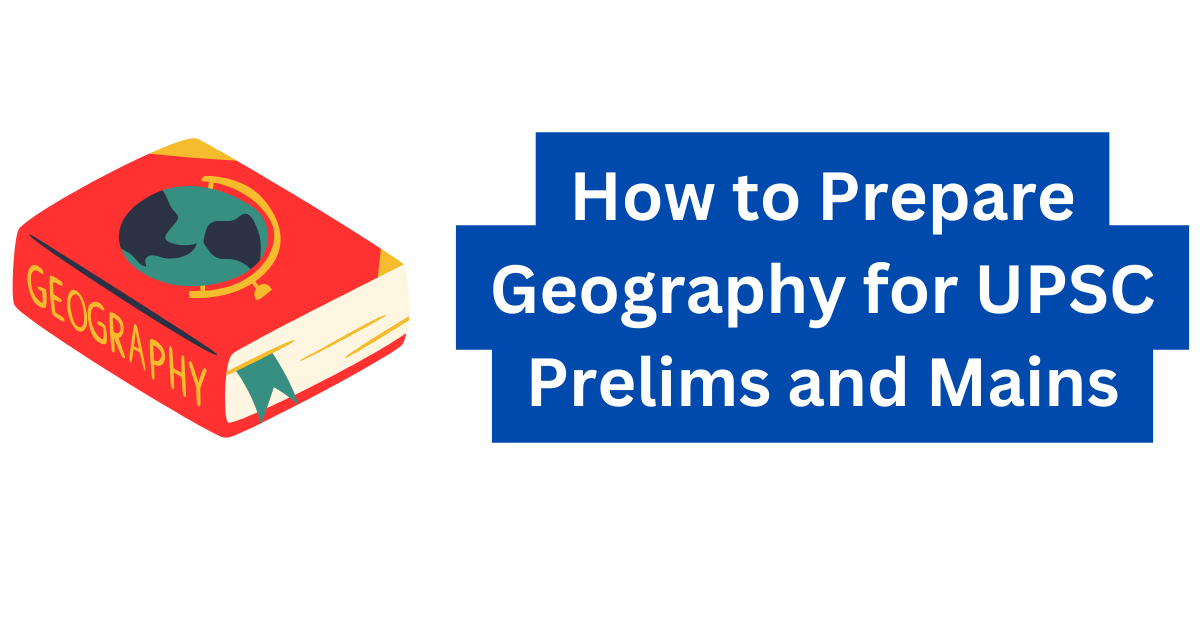Introduction
Geography is an important subject in the UPSC Civil Services examination. It is a part of both the Preliminary and Mains stages of the exam. Aspirants often find Geography to be a challenging subject due to its vast syllabus and the need for a multidisciplinary approach. However, with the right strategy and resources, one can effectively prepare for Geography and score well in the UPSC exam.
Understanding the Syllabus
The first step in preparing for Geography is to thoroughly understand the syllabus. The UPSC syllabus for Geography covers both physical and human geography, including topics like geomorphology, climatology, population, and settlement geography. By understanding the syllabus, aspirants can identify the key areas to focus on and plan their preparation accordingly.
Collecting Resources
Once the syllabus is clear, the next step is to collect the right resources for preparation. There are several books and study materials available in the market that cover the entire Geography syllabus for UPSC. Some recommended books include ‘Certificate Physical and Human Geography’ by Goh Cheng Leong, ‘Oxford School Atlas’ by Oxford University Press, and ‘Indian and World Geography’ by Majid Husain. Aspirants should also make use of online resources such as websites, blogs, and YouTube channels that provide valuable insights and explanations.
Creating a Study Plan
Geography is a vast subject, and it is important to have a well-structured study plan to cover the entire syllabus. Aspirants should allocate sufficient time for each topic and create a timetable that suits their learning style and preferences. It is advisable to divide the syllabus into smaller sections and cover them systematically. Regular revision is also crucial to retain the information and improve understanding.
Practicing Previous Year Question Papers
One of the most effective ways to prepare for Geography in UPSC is to practice previous year question papers. This helps aspirants understand the exam pattern, the type of questions asked, and the level of difficulty. By solving these papers, candidates can also identify their strengths and weaknesses and work on improving them. It is recommended to solve at least 5-10 years’ worth of question papers to get a good grasp of the subject.
Referencing Current Affairs
Geography is a dynamic subject that is closely linked to current affairs. Aspirants should stay updated with the latest developments in the field of geography, such as climate change, natural disasters, and geopolitical issues. Reading newspapers, magazines, and online sources can provide valuable insights and help in answering questions related to current affairs in the exam.
Joining Test Series and Mock Tests
To assess their preparation and improve their performance, aspirants should join test series and take mock tests. This helps in simulating the actual exam environment and provides an opportunity to practice time management. By analyzing the test results, candidates can identify their weak areas and work on them before the actual exam.
Effective Resources for Geography Preparation
Books:In addition to NCERTs, some recommended books for geography include ‘Certificate Physical and Human Geography’ by Goh Cheng Leong, ‘Oxford School Atlas’ by Oxford University Press, and ‘Geography of India’ by Majid Husain.
Online Resources:Websites like the ‘National Geographic’ and ‘Geography and You’ can provide valuable insights and information.
Coaching Institutes:If you feel the need for guidance, consider enrolling in a reputed coaching institute specializing in UPSC preparation
Mock Tests:Take regular mock tests for both Prelims and Mains. It helps in time management and self-assessment.
UPSC Prelims – Laying the Groundwork
Start with NCERTs :The National Council of Educational Research and Training (NCERT) textbooks on geography, especially the ones for classes 6 to 12, are an excellent starting point. These books provide a comprehensive understanding of basic concepts, and the language is easy to grasp.
Make Notes:As you read through the NCERTs, take notes. Creating concise and organized notes helps you revise more effectively. Highlight key terms and concepts, and make sure to note down examples and case studies
Stay Updated:Keep an eye on current affairs related to geography. Many questions in the Prelims are based on current events. Read newspapers and follow reliable online sources to stay informed
Atlas Study:Familiarize yourself with the world map. Invest in a good atlas and spend time locating countries, capitals, major mountain ranges, rivers, and important geographical features
Practice Previous Year Papers:Solving previous year’s UPSC Prelims papers will give you an idea of the types of questions asked. It’s an excellent way to gauge your preparation.
Previous Year Question Papers UPSC
UPSC Mains – Going Deeper
Optional Paper:If you choose geography as your optional paper in the Mains, it’s crucial to delve into advanced geography books and study materials. The optional paper is considerably more in-depth, and mastering it requires dedicated effort.
Geography of India:For both Prelims and Mains, you must have a solid understanding of the geography of India. This includes physical, political, economic, and social aspects. Special books and resources are available for this purpose.
Geopolitics: In Mains, you might encounter questions related to geopolitical issues. Understanding the global political landscape and how geography influences international relations is vital.
Practice Answer Writing:Geography in Mains is not just about knowledge; it’s about presentation. Practice answer writing to communicate your knowledge effectively. Use maps, diagrams, and real-world examples to support your answers.
Current Affairs:just as in Prelims, current affairs play a significant role in Mains. Relate your answers to recent geographical developments, be it environmental issues, disasters, or territorial disputes.
Conclusion
Preparing for Geography in UPSC requires a comprehensive approach and consistent effort. By understanding the syllabus, collecting the right resources, creating a study plan, practicing previous year question papers, referencing current affairs, and joining test series, aspirants can effectively prepare for Geography and increase their chances of success in the UPSC Prelims and Mains.

2 thoughts on “How to Prepare Geography for UPSC Prelims and Mains”